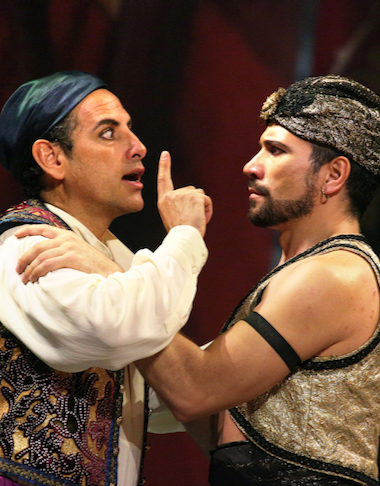A bit of a success in its time, Ricciardo e Zoraida soon disappeared to be resurrected only in 1990 by the Rossini Festival (that unquestioningly does all Rossini). Improbable as it may seem just now in Pesaro it attracted two major singers, Juan Diego Flórez as Ricciardo and South African soprano Pretty Yende as Zoraida, even though each has but one aria the entire evening.
The story is a generic, old style chivalric tale — exotic tyrant wishes to marry a damsel loved by a Christian knight, slightly complicated by a father who has his own ideas. Compared to the great Rossini tragedies of this same (Naples) period it is of slight dramaturgical interest, and therefore of lesser musical challenge for Rossini.
Its musical lines are however exquisitely Rossini, starting with the overture’s extended and quite lovely clarinet and horn solos followed by a brilliant flute display, brazenly interrupted from time to time by a raucous military band — a first use of stage musicians by Rossini, and quite startling indeed.
The African tyrant Agorante was sung by Russian bari-tenore Sergey Romanovsky whose darkly colored tenor voice soared with easy heft to the required high C’s, simultaneously sculpting elaborate coloratura in his lengthy aria. It was his one and only aria, an auspicious inauguration of this evening of spectacular vocal fireworks.
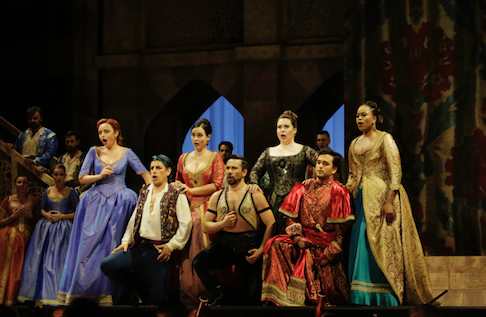 Front row Juan Diego Flórez, Sergey Romanovsky, Xabier Anduaga as Ernesto (a Christian ambassador). Back row Sofia Mchedlishvili as Fatima (Zoraide's confidant), Martiniana Antonie as Elmira, Victoria Yarovaya as Zomira (Agorante's wife); Pretty Yende (in gold gown)
Front row Juan Diego Flórez, Sergey Romanovsky, Xabier Anduaga as Ernesto (a Christian ambassador). Back row Sofia Mchedlishvili as Fatima (Zoraide's confidant), Martiniana Antonie as Elmira, Victoria Yarovaya as Zomira (Agorante's wife); Pretty Yende (in gold gown)
If Pretty Yende seemed vocally tentative in her initial scenes — a duet with the tyrant’s current wife, Zomira, becoming a trio by adding the lovesick tyrant Agorante — it was perhaps because she was simply coping with a dramatically awkward situation (the other woman), exacerbated when Ricciardo unexpectedly showed up. She did hold her own in their extended duet.
But by the time la Yende, her stage father Ircano and Ricciardo got rescued from the tyrant’s clutches she was in magnificent voice and delivered her one aria with ultimate virtuoso aplomb. Though Rossini had embedded his usual soprano showpiece finale within the larger finale (in which the Christian forces overwhelmed those of Agorante and everyone forgave everyone), the glories of her shining high notes (well above the staff) lingered and the energy of her coloratura endured earning her an ovation at the curtain calls that well surpassed the ovation awarded to Juan Diego Flórez for his splendid Ricciardo.
Tenorissimo Flórez had great opportunity to show off his high C’s and his impeccable fioratura while imbuing his character with the welcomed notion that we didn’t have to take any of this too seriously, that after all this Rossini opera was meant to be about singing and that he can do, as everyone knows.
The production was staged by French director Marshall Pynkoski, a specialist in Baroque and proto-Romantic opera. Thus the staging was highly formalized in static stage pictures. Action when demanded was in the abstract choreography of five ballerinas and six male dancers — there were pompous entrances by the tyrant, preparations for beheadings, and a great battle among other, lesser activities. The extensive choreography was created by Jeanette Lajeunesse Zingg (Mr. Pynkoski’s wife).
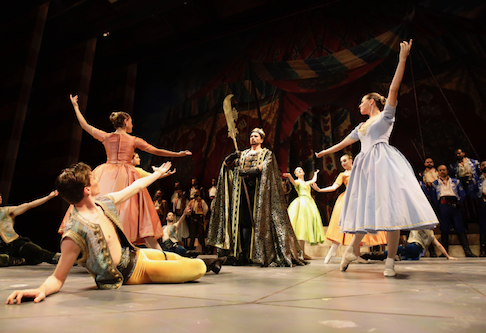 An entrance of Agorante with ballet
An entrance of Agorante with ballet
Mr. Pynkoski did avail himself of the “close-up” technique so effectively used by director Pier Luigi Pizza in the Rossini Festival’s ad hoc 1200-seat theater inside Pesaro’s massive Adriatic Arena. Singers are brought outside the proscenium onto a catwalk fronting the orchestra pit, thus eliminating all scenic and musical context. The direct contact of these superb Rossini singers with the audience was an awesome experience.
Canadian set designer Gerard Gauci, a collaborator of Mr. Pynkoski at Versaille’s Opéra Atelier offered backdrops of painted canvas in monumental shapes and somber color. Appropriate period costumes were created by Michael Gianfrancesco, a Canadian colleague of Mr. Gauci. Neither sets nor costumes, nor Mr. Pynkoski’s staging for that matter, succeeded in finding the indulgent smile we might confer on such a precious literary relic.
Italian conductor Giacomo Sagripanti presided over the Orchestra Sinfonica Nazionale della RAI. The young maestro set the elegant musical level of the evening in the overture, finding its caressing lines, encouraging the excellent solo playing, stoically tolerating the noisy stage band, then providing Rossini’s richly colored foundation for some of Rossini’s loveliest vocal lines. The maestro’s tempi kept the easy energy needed to sustain ornamental singing and at the same time drive the opera’s substantial ensembles to maximum effect.
It is not hard to fathom why Giachino Rossini returned to the very simple one-act semi-serious farsa form of his youth after creating his four magnificent character comedies, as well as coping with libretti based on Shakespeare and Sir Walter Scott among other literary luminaries for his Neapolitan tragedies — he was paid to do it (but that’s another story)!
Adina is the essentially the same story as Ricciardo e Zoraide. An older Persian caliph has taken a fancy to a beautiful prisoner of his seraglio and is about to marry her. Her former fiancé Selimo appears, whom she has believed to be dead after the shipwreck that separated them. The lovers hatch plans to escape with the help of Mustafa, the palace gardener. Ali, servant and confident of the caliph becomes aware or the plot. It fails. But as it turns out Adina is the long lost daughter of the caliph, thus Selimo need not be executed.
There are little complications to sing about. Selimo feels betrayed by Adina who is about to marry the caliph. Adina respects the caliph and is grateful to him for rescuing her. Adina believes Selimo to have been executed and is distraught.
Rossini actually recycled much of Adina’s music from his early operas and even borrowed musical material from other composers. Nonetheless Adina is still the musically mature Rossini, the vocal lines boast his ultimate sophistication. There is a splendid quartet near the end of great effect, plus a robust, exciting finale (with Adina’s splendid “Dove sono? Ancora respiro?”) composed especially for this operatic stepchild, the two pieces alone making the evening worthwhile.
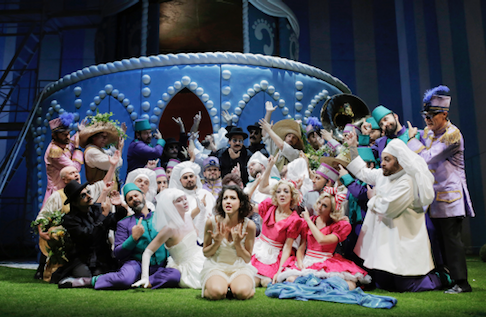 Lisette Oropesa (center) with chorus of the Teatro della Fortuna M Agostini
Lisette Oropesa (center) with chorus of the Teatro della Fortuna M Agostini
Adina was sung by New Orleans born soprano Lisette Oropesa well known to L.A. and Met audiences as Lucia. An able Rossini singer as well, she did find the singerly excitement of her final aria. Her fiancé Selimo was ably sung by South African tenor Levy Sekgapane whose aria “Giusto ciel, che i dubbi miei tu conosci” is really a beautiful duet with English horn, attesting Rossini’s mature orchestral sophistication. The caliph was sung by Italian baritone Vito Priante, bringing the energy of his usual big-house Figaro to the caliph’s lone aria “D’intorno il Serraglio.” Completing the small farsa cast were character singers Matteo Macchioni as Ali who dutifully delivered his “aria di sorbetto” (a secondary singer’s small aria near the end of an opera) and Davide Giangregorio as Mustafa.
That the singers in this new production made little impression can be attributed to its metteur en scène, Rosetta Cucchi. Sig.a Cucchi is a pianist once associated with the Rossini Festival. Turned provincial opera house stage director she is now on the artistic staff of Ireland’s Wexford Festival. This Adina is a shared production with that festival.
Rather than allowing Rossini’s farsa process to work naturally, allowing its singers to expose Rossini’s prototype characters, this director imposed a blinding, supposedly comic environment (saturated pinks, blues and greens for the decor) that overwhelmed mere Rossini.
The stage was dominated by one huge scenic image — a three tiered wedding cake with the bride and groom statuette on the top (who were real people echoing the ins and outs of the farsa action).
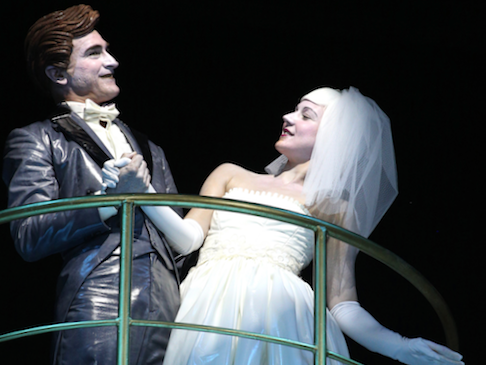 Live groom and bride statuette
Live groom and bride statuette
When the caliph wasn’t in a gold lame suit jacket for the wedding that never happened he was in a bubble bath singing his aria. Adina herself was accompanied by two mincing acolytes in short pink dresses. Selimo got off a bit easier appearing in a simple frocked shirt and gold vest as did his gardener sidekick who donned a straw hat adorned with foliage as well. The caliph’s henchmen threatened the lovers with colorful toy Uzis. There was not a turban or eunuch in sight.
A protege of Venezuela’s famed “Sistema” and now music director of Venice’s La Fenice, young (33 years old) conductor Diego Matheuz gave a fine account of this minor Rossini score, respecting the current performance practices that favor stylistically informed singers. The Orchestra Sinfonica G. Rossini, resident orchestra of Le Marche’s historic theaters (Pesaro, Fano, Jesi and Pergola) performed at its usual high level. The male chorus of the Teatro della Fortuna M Agostini in Fano (a small city 12 kilometres south of Pesaro) did its best to fulfill stage director Cucchi’s idea of what fun is not.
Michael Milenski
Cast and production information:
Ricciardo e Zoraide Agorante: Sergey Romanovsky; Zoraide: Pretty Yende; Ricciardo: Juan Diego Flórez; Ircano Nicola Ulivieri; Zomira: Victoria Yarovaya; Ernesto: Xabier Anduaga; Fatima: Sofia Mchedlishvili; Elmira: Martiniana Antonie; Zamorre: Ruzil Gatin. Chorus of Teatro Ventidio Basso, Orchestra Sinfonica Nazionale della RAI. Conductor: Giacomo Sagripanti; Metteur en scène: Marshall Pynkoski; Coreografie: Jeannette Lajeunesse Zingg; Scene: Gerard Gauci; Costumi: Michael Gianfrancesco; Luci: Michelle Ramsay. Arena Adriatico, Pesaro, August 20, 2018.
Adina Califo: Vito Priante; Adina: Lisette Oropesa; Selimo: Levy Sekgapane; Alì: Matteo Macchioni; Mustafà: Davide Giangregorio. Chorus of the Teatro Della Fortuna M. Agostini, Orchestra Sinfonica G. Rossini. Conductor: Diego Matheuz; Metteur 3n scène: Rosetta Cucchi; Scene: Tiziano Santi; Costumi: Claudia Pernigotti; Luci: Daniele Naldi. Teatro Rossini, Pesaro, August 18, 2018.
